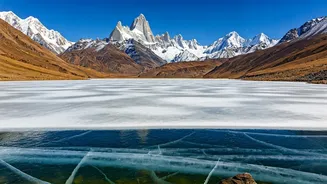Early Freeze Alarm
The October freezing of Devtal Lake in the Chamoli district, Uttarakhand, at a bone-chilling -10 degrees Celsius, is a significant event. This occurrence
is a notable departure from the lake's usual freezing patterns, as it typically freezes much later in the year, usually in December or January. This change underscores the accelerated impact of climate change in the Himalayan region. The freezing of Devtal so early acts as a clear indicator of altered climatic conditions and fluctuating temperatures, contributing to concerns about the overall health of the environment. The unusual temperature drops recorded are directly related to increasing climate instability, affecting the timing and intensity of seasonal changes in this area.
Climate Change Impact
The premature freezing of Devtal Lake serves as a stark indicator of the detrimental effects of climate change in the Himalayas. This region, known for its fragile ecosystem, is disproportionately impacted by rising global temperatures, leading to an intensification of erratic weather patterns. The early freeze is a symptom of these broader environmental changes, with rising temperatures and altered precipitation patterns influencing the freeze-thaw cycles of mountain lakes. These changes have the potential to disrupt local ecosystems, affecting water availability, biodiversity, and the livelihoods of communities dependent on the region's natural resources. The event underscores the critical need for global efforts to curb climate change.
Consequences of Changes
The implications of Devtal Lake's early freeze extend far beyond a single environmental phenomenon. Changes like this can disrupt the delicate balance of the local ecosystem. For example, early freezing can alter the lifecycle of aquatic organisms, including fish and invertebrates. It can also impact the availability of water resources, which are essential for communities living in the Himalayas. The early freeze contributes to shifts in the timing of seasonal events, from the melting of snow and ice to changes in vegetation growth cycles. These far-reaching impacts highlight the urgency of addressing climate change and its complex effects on sensitive environments such as the Himalayas. It is a critical warning about the need for careful management and global mitigation efforts.
Monitoring and Adaptation
The incident at Devtal Lake emphasizes the importance of sustained monitoring and proactive adaptation strategies. Continuous observation of environmental indicators, such as lake temperatures and freeze patterns, is critical for understanding the evolving impact of climate change. Detailed data collection allows for better tracking of these changes. In addition to monitoring, communities and policymakers must adopt adaptive measures to mitigate the negative consequences. This includes investing in water conservation techniques, promoting sustainable land management practices, and developing early warning systems for climate-related hazards. Successful adaptation will require a collaborative approach that brings together government agencies, local communities, and scientific experts to build resilience and safeguard the region's precious natural resources.
A Call to Action
The freezing of Devtal Lake should be viewed as a strong call to action for the world. It underlines the necessity of immediate and decisive measures to combat climate change, protect vulnerable ecosystems, and promote sustainable practices. Tackling the issue of climate change includes a collective responsibility that incorporates reducing greenhouse gas emissions through the use of renewable energy, supporting environmental protection projects, and educating the public. It also means strengthening international cooperation to implement comprehensive climate action plans. The situation at Devtal Lake provides an undeniable reminder of the urgency of the matter and the crucial need for global cooperation to secure the health of the planet for future generations.





















